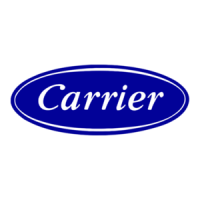50
Return−Air Filters
Ensure correct filters are installed in unit (see Appendix II
− Physical Data). Do not operate unit without return−air
filters.
Outdoor−Air Inlet Screens
Outdoor−air inlet screen must be in place before operating
unit.
Compressor Mounting
Compressors are internally spring mounted. Do not loosen
or remove compressor hold down bolts.
Internal Wiring
Check all electrical connections in unit control boxes.
Tighten as required.
Refrigerant Service Ports
Each unit system has two 1/4” SAE flare (with check
valves) service ports: one on the suction line, and one on
the compressor discharge line. Be sure that caps on the
ports are tight.
Compressor Rotation
EQUIPMENT DAMAGE HAZARD
Failure to follow this CAUTION could result in
equipment damage.
Scroll compressors can only compress refrigerant if
rotating in the right direction. Reverse rotation for
extended times can result in internal damage to the
compressor. Scroll compressors are sealed units and
cannot be repaired on−site.
CAUTION
NOTE: When the compressor is rotating in the wrong
direction, the unit will make an elevated level of noise
and will not provide cooling.
On 3−phase units with scroll compressors, it is important
to be certain compressor is rotating in the proper
direction. To determine whether or not compressor is
rotating in the proper direction:
1. Connect service gauges to suction and discharge pres-
sure fittings.
2. Energize the compressor.
3. The suction pressure should drop and the discharge
pressure should rise, as is normal on any start−up.
If the suction pressure does not drop and the discharge
pressure does not rise to normal levels:
1. Note that the evaporator fan is probably also rotating
in the wrong direction.
2. Turn off power to the unit and install lockout tag.
3. Reverse any two of the unit power leads.
4. Reapply electrical power to the compressor.
5. The suction pressure should drop, and the discharge
pressure should rise, which is normal for scroll com-
pressors on start−up.
6. Replace the compressor if suction/discharge pressures
are not within specifications for the specific compres-
sor.
Cooling
Set space thermostat to OFF position. To start unit, turn on
main power supply. Set system selector switch at COOL
position and fan switch at AUTO. position. Adjust
thermostat to a setting below room temperature.
Compressor starts on closure of contactor.
Check unit charge. Refer to Refrigerant Charge section.
Reset thermostat at a position above room temperature.
Compressor will shut off. Evaporator fan will shut off
after a 30−second delay.
To shut off unit, set system selector switch at OFF
position. Resetting thermostat at a position above room
temperature shuts unit off temporarily until space
temperature exceeds thermostat setting.
NOTE: The default value for the evaporator−fan motor
on/off delay is 45 seconds. The Integrated Gas Unit
Controller (IGC) modifies this value when abnormal limit
switch cycles occur. Based upon unit operating conditions,
the on delay can be reduced to 0 seconds and the off delay
can be extended to 180 seconds. When one flash of the
LED is observed, the evaporator−fan on/off delay has
been modified.
Ventilation (Continuous Fan)
Set fan and system selector switches at ON and OFF
positions, respectively. Evaporator fan operates
continuously to provide constant air circulation. When the
evaporator−fan selector switch is turned to the OFF
position, there is a 30−second delay before the fan turns
off.
START−UP, PREMIERLINK] CONTROLS
ELECTRICAL OPERATION HAZARD
Failure to follow this warning could result in personal
injury or death.
The unit must be electrically grounded in accordance
with local codes and NEC ANSI/NFPA 70 (American
National Standards Institute/National Fire Protection
Association.)
!
WARNING
Use the Carrier network communication software to start
up and configure the PremierLink controller.
Changes can be made using the ComfortWORKS
software, ComfortVIEW software, Network Service
Tool, System Pilot device, or Touch Pilot device. The
System Pilot and Touch Pilot are portable interface
devices that allow the user to change system set−up and
setpoints from a zone sensor or terminal control module.
During start−up, the Carrier software can also be used to
verify communication with PremierLink controller.

